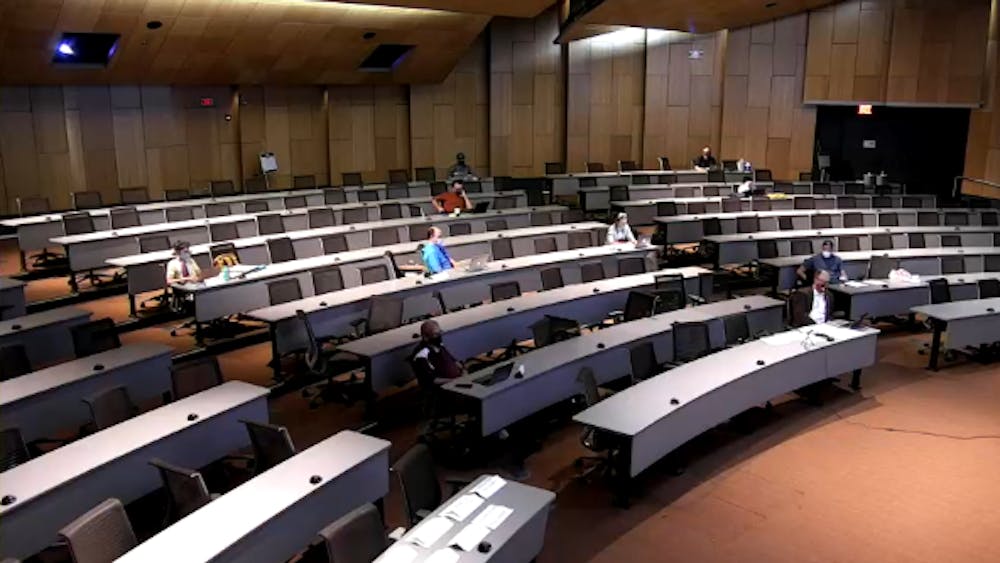Academic Senate expresses concerns with shared governance, COVID-19 decisions
The Academic Senate nearly went over its allotted meeting time on Tuesday as senators rushed to share their worries about the university.
Faculty senators raised numerous concerns with Central Michigan University’s systems of shared governance and COVID-19 policies, asking for a “state of the university” discussion with administrators.
“My opinion about how shared governance is going at this university is that we are told what to do,” Senator Martha Frank said. “We sometimes get a chance to react, but it’s like an agenda is set and we aren’t really part of setting the agenda.”
“I don’t consider sharing to be someone telling me what to do,” Frank said.
President Davies was not present at the senate meeting. Some senators expressed concerns with his absence.
“The president—through his comments—has shown that he really doesn’t understand the function of an academic senate,” Senator David Smith said. “Quite deliberately, this institution was designed to include both administrators and faculty. Faculty try to persuade the administration and the administrators should take the responsibility to try and persuade the faculty so that we can develop policies that allow us to go forward with a sense of community. The president has not taken that responsibility. He doesn’t even see himself as a part of the academic senate, apparently.”
Senators also had grievances with COVID-19 policies on campus in response to Provost Schutten’s report. Schutten apologized for discrepancies in CMU’s COVID-19 dashboard, saying the problems are now fixed. Senator Joanne Dannenhoffer criticized the university, saying the mistake should not have happened.
“Scientists have rules for the way data is presented and there has been an incorrect graphical representation of (COVID-19) data that’s been going on for a year and half,” Dannenhoffer said. “I really think as an institute of higher learning, our dashboard should adhere to the rules of accurate and understandable data representation.”
Senator Andrew Criswell said new signs should be posted around campus to communicate mask mandates. Criswell teaches in the Rose Center, where he said student mask enforcement is a problem he has had to combat.
Senator Max Ranger said some quarantined students are failing their classes because instructors are not offering hyflex options. Schutten responded, saying instructors are still required to accommodate student needs.
The agenda also included several other topics.
COVID-19 Updates
In her report, Provost Schutten said 62 percent of students are now vaccinated. So far 2,497 students have been found “non-compliant” with vaccination or testing requirements. After a week of non-compliance students will be charged a $100 fee. Continued non-compliance could lead to other penalties, including eventual expulsion.
New Provost Search
According to the president and provost joint report, the search committee for Provost Schutten’s replacement is being organized. Two representatives each from the Academic Senate, the Council of Chairs and the Student Government Association have been chosen. One representative from each of the seven academic colleges will also be nominated by their deans and approved by the president. Davies will announce the full committee in early October.
Study Abroad in Spring 2022
The Office of Global Engagement released a summary of its plan for a controlled reopening of study abroad programs in the Spring. Safety steps include requiring vaccinations for participants and vetting host countries and schools based on their COVID-19 policies.
Academic Integrity
The Academic Senate passed a proposal to create a committee for assessing the academic integrity policy. The motion said hyflex formats have made it easier for students to cheat on coursework, creating a need to reexamine the policy. The motion also included a suggestion to lock students’ Blackboard shells until they sign an integrity pledge.
Criswell disagreed with the proposal and said the task of preventing academic dishonesty should rest with instructors, not students.
“Regarding the pledge that’s talked about here, that really bothers me,” Criswell said. “It’s just childish. It’s grade school stuff and it’s insulting to our students to consider something like that. We should respect and trust our students. They are adults, not children, and should be treated as such.”
Senator David Smith agreed with the proposal and said faculty should not have to “carry the burden” of maintaining honesty.
“I don’t want to spend all of my time in a warfare mode against the strategizing of my students,” Smith said. “I want to be able to assume that there’s a consensus around this, and I think having a pledge is a way of helping to create that.”
Change to Curricular Authority Document
The senate voted to rescind a previous motion so it could elaborate the language used in it. The motion would make all course prerequisites more transparent to help students choose classes. Senators felt the motion was passed too hastily and should be discussed further.
Senate meetings are recorded and can be viewed on the Academic Senate homepage, along with livestream links.







